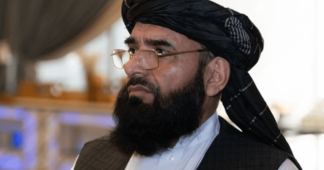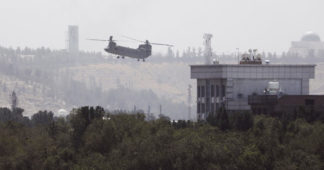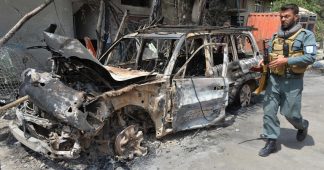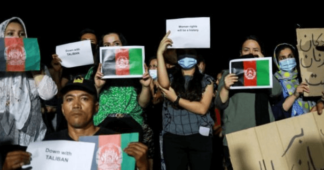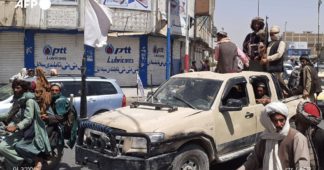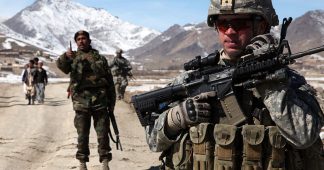By Herman Michiel
17 August 2021
We saw Taliban troops parade in the presidential palace in Kabul, from which President Ashraf Ghani fled abroad. The largely US-educated professor and former World Bank employee symbolises the puppet regime that the Americans installed in Kabul, just as they did in Vietnam in the 1960’s. Just like then (1975), the Americans now have to leave the country in a hurry, with disbelief that a bunch of unruly people take the capital and the rest of the country in a matter of days. There are differences between Kabul and Saigon, because then the war was against a progressive anticolonial liberation struggle, in Afghanistan retrograde religious fundamentalists are the victors. But in neither case could a phantom army with technologically superior destructive power prevail. There is another difference. The Vietnam War was a US affair, for the war in Afghanistan Washington could reckon on NATO allies from 2006 onwards. A whole series of EU Member States (British, French, Germans, Dutch, Belgians, Poles …) have complied with the American wishes and helped to further disrupt the country for 20 years.
Even those who naively assume that the purpose of this 20-year war was to defend democracy, human rights and women’s rights in Afghanistan will have to admit that the perhaps 300,000 casualties and the 2,200 billion dollars that the US alone spent on it have only resulted in the Taliban being more firmly entrenched than ever and in new flows of refugees. And with what authority could Western diplomats still play a mediating role? Only Russia and China will be able to do so. Or one should think that Josep Borrell, the ‘High Representative of the European Union for Foreign Affairs and Security Policy’ will be listened to. As recently as 12 August, he called on the Afghan Government to begin negotiations with the Taliban; less than a week later, however, there is no longer an Afghan government.
Afghanistan is not a case apart. Western military logic failed equally in Iraq and in Libya, in the latter country the result was the installation of a ‘failed state’… But will Western leaders draw any conclusion? Their silence is currently deafening. Or they must make almost pitiful statements like Borrell, or NATO Secretary-General Stoltenberg who said without hesitation, “We remain committed to supporting a political solution to the conflict.” Even more shocking is the statement by Sammy Mahdi, the Belgian State Secretary for Asylum and Migration, who, with his Christian Democratic big heart, promised that Afghan asylum seekers who have exhausted all legal remedies in Belgium will not for the time being be sent back to their country by force, just a few days after Belgium and five other member states had insisted to go on with the deportations to Afghanistan.
Indignation is good, but political lessons are better:
- Our governments cannot be counted on for a real peace policy and real attempts to mediate in conflicts. Their ties to military industry, their mindless docility to NATO and US imperialism make them unsuitable for the task, despite all their think tanks and ‘peace institutes’. It is the peace movements, which fortunately have strong supporters in a number of European countries, that must continue to fuel the social debate and make broad layers of the population aware that what the political leaders call ‘defence’ has nothing to do with the security of citizens.
- A central element should be the opposition to the purchase of new fighter planes. Even where these have already been ordered, the contracts must be cancelled, and the development of new ones – such as the European FCAS jet – must be opposed by all means. After all, what is the purpose of these fighter jets? Let’s assume that they do not serve to attack Western-European countries (although, the NATO bombing of Yugoslavia in 1999…). So they serve for operations like in Afghanistan, Iraq or Libya, three cases where the air strikes dramatically aggravated the situation. Fighter planes are extremely expensive instruments for even more misery. Citizens should no longer put up with taxpayers’ money being used for such inhumane purposes, while the scarcity of public resources is always invoked when real needs are at stake.
- Indeed, the current period of time shows all too clearly what really threatens the safety of citizens, and what should be done about it. Gigantic forest fires cannot be fought for lack of resources. Governments are slow and inefficient in dealing with floods, although climate scientists have long pointed to the threat of such calamities. We are not safe from the coronavirus until every inhabitant of the planet is safe, they say, but they refuse to give poor countries the means to vaccinate their people. The ‘safety of our citizens’ is not threatened by fantasised attack plans from China or Russia, but by the wrong options of our regimes.
- If we want to take some responsibility for the evil done by our governments, we should at least insist on a broad application of the right of asylum. There is some talk about ‘our interpreters who we will, of course, evacuate’, but it is not only interpreters who want to leave the country, as was seen when Kabul airport was occupied by hundreds of panicking people, some of whom have been shot by US soldiers. The German chancellor candidate Laschet already warned that the mistakes of 2015 should not be repeated” and he insisted on European humanitarian aid ‘in the region’. Fortress Europe sent its dark knights abroad, but after the return of the defeated knights, the drawbridge will be raised for the victims of their raids…
